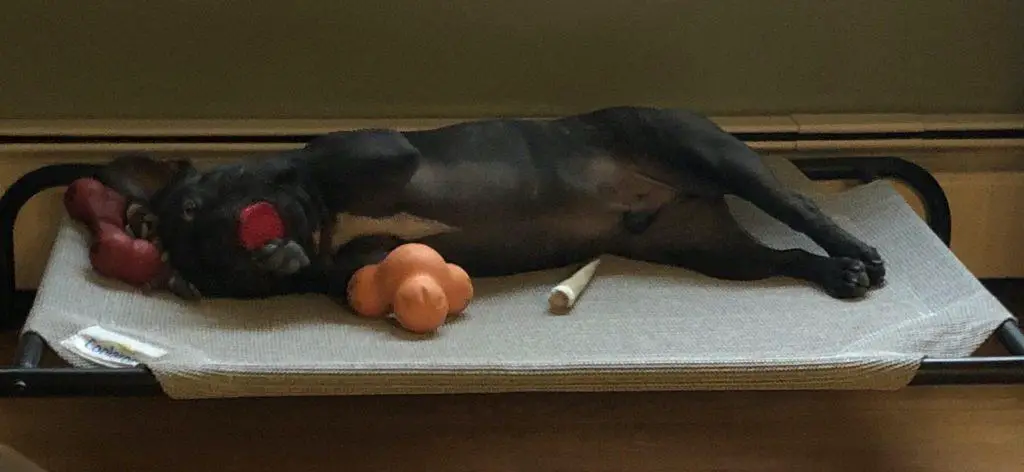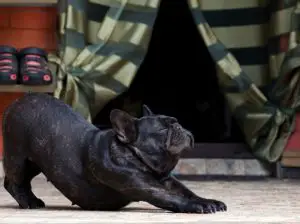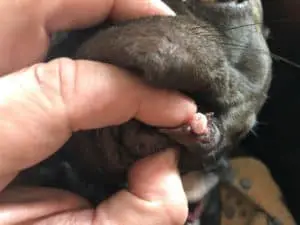French Bulldog Hotspots are very frustrating for every Frenchie owner, not to mention the dog itself. They’re uncomfortable, usually painful, and a menace to deal with. There is a lot of preventive care a Frenchie owner must do to make sure he or she doesn’t have an itchy Frenchie.
You may think these are simply some minor itchy skin spots, but the truth is: they’re more severe than you think. Hot spots need to be treated with care and nipped in the bud. The cause must always be found and eliminated.
French Bulldog Hotspots: What Are The Most Common Ones?
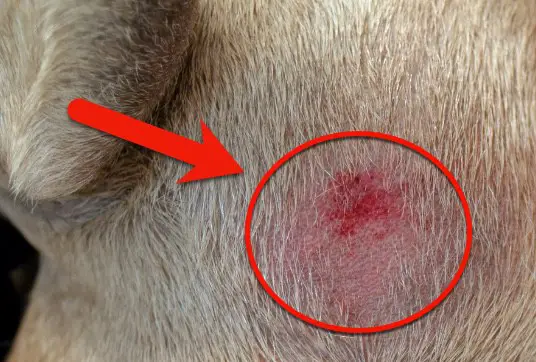
Clinically speaking, The Vets explain that hotspots represent a focal area on your bulldog’s skin that appears to be inflamed, infected, red, moist, itchy, painful, and oozy. As you can imagine, these spots stress out our dear French Bulldogs.
Frenchies can’t stop licking the area, which causes further irritation and even more pain. Thus, it’s important to watch your dog and perform regular body examinations to identify any possible hot spots. If you do find one, it has to be treated as soon as possible. Otherwise, the affected area may spread to other parts of the body.
French Bulldog hotspots are typically triggered by an itchy irritant, for example:
- Fleas: Bulldog flea bite allergy
- Insect bite: spider bites or ant bites
- Allergic reaction: a reaction to plants, grass, trees, food, or other factors
- Skinfold dermatitis: a skin reaction to dampness and moisture when yeast and bacteria colonies form on the dog’s skin.
The initial reaction to all triggers is an inflamed area, which is always itchy and painful, triggering a never-ending cycle of biting and scratching.
French Bulldog hotspots may be caused by more than allergic reactions, bacterial infections, or yeast infections. Acute moist dermatitis is a common hot spot. All canines have it, especially short-haired dog breeds.
Then, there’s chronic dry skin or flaky skin, which is very common for French Bulldogs that live in dry climates or are bathed too often. Dry skin causes itchiness, which can lead to hair loss.
Moving on, there’s the everlasting problem of plain old dog dandruff.
All these hair and skin issues may be triggered by excessive bathing, so make sure to use appropriate medicated shampoo to treat these skin conditions.
Some French Bulldogs suffer from atopic dermatitis caused by numerous irritants and even household allergens. We treat atopic dermatitis by performing a skin scrape test, which involves scraping a small sample of the lesion on your Frenchie and testing it for the presence of a specific bacterium. It’s a simple test, which, in combination with shaving the area, will increase the efficacy of topical ointments and antibiotics. Atopic dermatitis goes hand in hand with seborrhea, the canine equivalent to seborrheic dermatitis in humans.
Moving on to some not-so-pleasant skin infections. Many puppies may suffer from impetigo, a skin allergy resulting in pus-filled blisters. Superficial bacterial folliculitis is another skin infection that can be easily spotted as Frenchies have short hair. We treat them both with antibiotics since they have a bacterial origin.
Some skin conditions are far more dangerous than they may seem. Take ear infections, for example. If not treated, ear infections may cause deafness, especially for dogs with floppy ears. So, if you’re wondering: Why does my dog ignore my commands? it may have a hearing problem that will need to be treated.
In most cases, your vet will use topical steroids or antibiotics to handle skin problems, as well as solutions like Domeboro powder to ease the itching and dry out the area. You will go home with some antifungal cream or a chlorhexidine-based antibacterial ointment to use over the next few days.
French Bulldog Hotspots: Food Allergies
Besides environmental allergies, food allergies are another serious health problem. In other words, every dog owner should have a tube of Benadryl at home.
A dog’s nutrition must be packed with proteins, good carbohydrates, and vitamins. Also, adding good fatty acids, such as omega-3 in the form of fish oil, will benefit your dog a lot. Fish oil has proven its efficacy in maintaining an excellent condition when it comes to a Frenchie’s coat.
If you feed your dog something outside its normal food, and it causes a reaction on your Frenchie’s skin, then you’ll need to do more than just see the vet. You will need to run full blood tests as well as allergy tests to ensure you’ve found the common cause of the dog’s skin condition.
Constant allergies will greatly affect the dog’s immune system, and your Frenchie pup may end up with more new allergies.
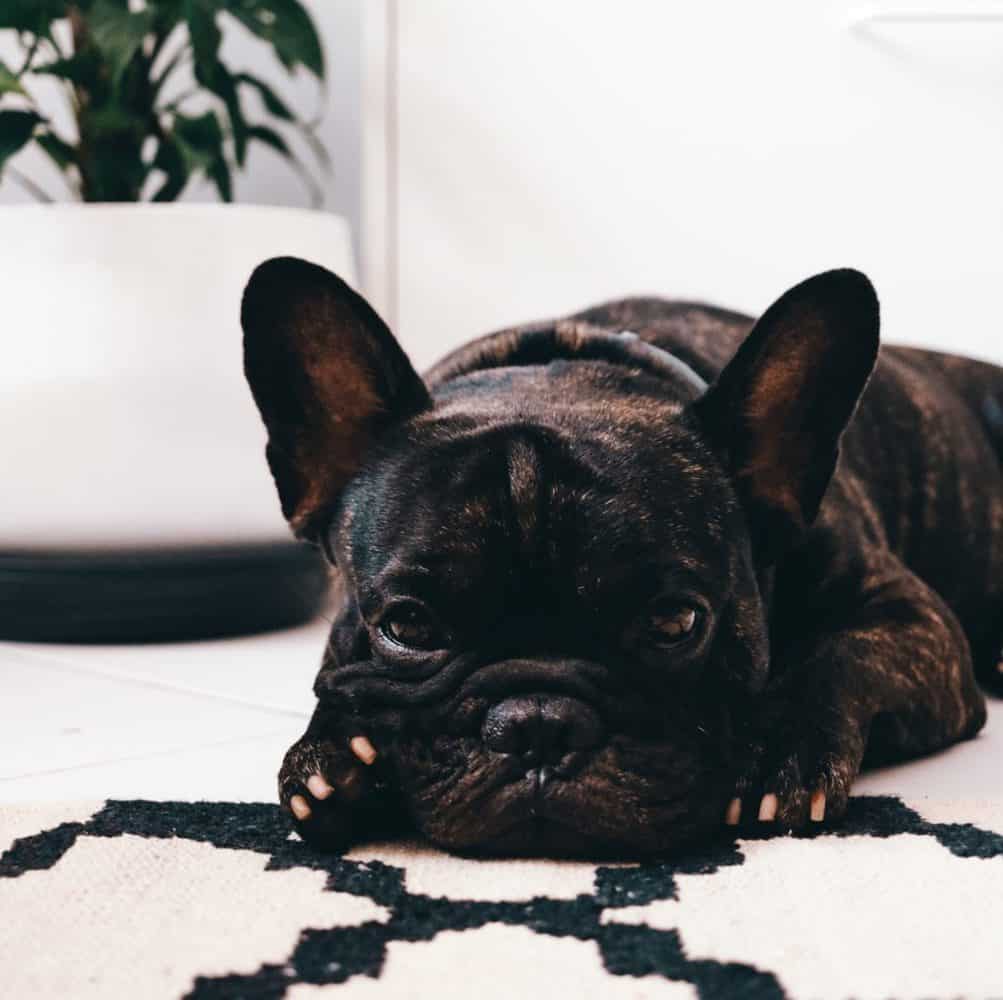
Can You Prevent French Bulldog Hotspots?
Of course, you can! In fact, you must prevent hotspots! Sure, it takes a lot of work, but it’s manageable and absolutely necessary.
If you follow these tips, you will most certainly have a hotspot-free French Bulldog:
- Regular flea and tick preventative care
- Regularly grooming your Frenchie and keeping it dry
- Avoiding known allergens, especially food or environmental ones
- Keeping your dog’s mind occupied with some activity to avoid boredom and stress
Unfortunately, you cannot completely avoid hotspots, but you can stick to the advice listed above as much as possible to avoid major outbreaks.
How To Treat Hotspots On French Bulldogs
The first step to treating any hot spot is cleaning the infected area. The affected area must be completely dry before administering any medication. If you don’t have medications at home, you can use something like coconut oil or aloe vera to soothe the area before you get an ointment like Neosporin. Sometimes hydrocortisone cream may be recommended by a Vet.
Also, some of the following topicals have proven to be excellent in major outbreak situations:
Dermapaw – an all-natural skin and paw treatment
Strawfield antiseptic spray
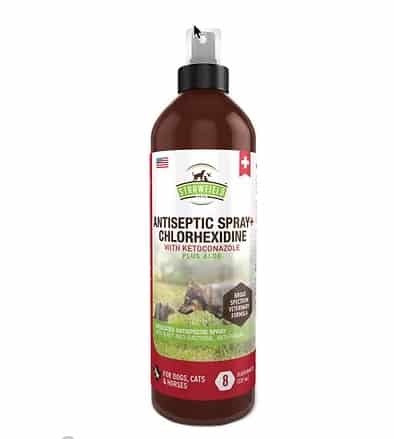
Earthbath Hot Spot Relief Shampoo
Real-life situations have proven that shaving the area will help dry the wound quickly and ease ointment application. What’s not so great about this is that your Frenchie will have to wear an Elizabethan collar or cone of shame for a few days. There’s really nothing funny about the cone; it is a huge help!
Vaccinations, especially for ringworms, play a huge part in preventing French Bulldog hotspots. So, you better be consistent in having your dog get all its shots.
Final Words on French Bulldog Hot Spots
No one said dealing with French Bulldog hotspots is easy. It’s frustrating, annoying, and difficult to treat. But, you need to do it for the sake of your dog. Once you figure out what’s causing these hotspots, it will be easier for you to prevent them.
As always, we suggest asking your vet for help, especially if the affected area is oozing or bleeding. Every hotspot must be treated immediately, or it will become worse. And that’s just something neither you, your dog, or your vet want.
PS – For more French Bulldog health articles visit here.
Author’s Bio:
Sarah Anderson is a veterinarian and author for Pupvine. Her love for our four-legged buddies (and other animals too!) made her pursue a career as a vet, but her writing career doesn’t suffer either. In her free time, Sarah volunteers at the local animal shelter and helps the pups believe that all of them deserve to be loved. Sarah always says: “I won’t stop until I know all dogs feel how loved they are.” Don’t stop, Sarah; you go, girl!

